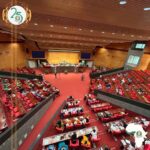By Ismail Abdulaziz
Nigeria needs sustainable strategies by the government and relevant stakeholders to proffer workable solutions to the rising cost of living.
Dr Alim Abubakre, Senior Lecturer at Sheffield Business School, London, made this known to the News Agency of Nigeria (NAN) on Monday in Abuja.
He said that the high cost of living is not peculiar to Nigeria alone, adding that it is a global challenge countries are facing.
“Countries like the UK have experienced sharp inflationary spikes, Sri Lanka faced severe food shortages, and Argentina continues to endure hyperinflation.
“As Nigeria embarks on economic reforms, including the reduction of subsidy payment and the flotation of the Naira, these challenges must be mitigated through innovative strategies across the short, medium, and long term,” Abubakre said.
He said that part of the short term strategic solution to the challenge was capacity building for leaders to navigate complex economic landscapes as well as innovative approaches to inflation, unemployment and poverty.
Abubakre said that the government’s efforts at providing palliatives for quick relief to challenges encountered from its new policies and programmes is in the right direction.
“One of the most effective ways to achieve this is through direct cash transfers. A similar initiative in Nigeria, targeted at the poorest households, will offer immediate relief and help prevent households from slipping into deeper poverty.”
He said that temporary tax reductions and reduction of import duties on staple foods and essential products would lead to lower retail prices and ease the burden on consumers.
“Another immediate intervention is providing subsidies for public transportation. With transport costs constituting a significant portion of household expenses, subsidies can ease commuting costs.
“Proper implementation and funding of the conversion and adoption of Compressed Natural Gas (CNG) for public transport (should continue) with vigour.
“The government should make the kits for conversion cheaper by working directly with manufacturers or, better still, encouraging them to start producing locally.”
Abubakre also suggested putting price caps on essential medicines and healthcare services to ensure affordability in the short term.
He said the South Africa’s Single Exit Price policy for medicines provided an example of how government intervention can keep healthcare accessible for citizens.
He also said that expansion of the school feeding programme of the President Bola Tinubu’s administration and establishing community kitchens would support the most affected populations.
“This should be negotiated into Corporate Social Responsibility mandates for corporations. The government should minimise direct involvement in such activities to reduce the risk of corruption.”
On the medium term solutions, Abubakre said they include boosting of local production, encouraging small and medium enterprises, investment in public transport infrastructure, supporting renewable energy adoption and provision of affordable housing through public and private sector collaboration.
The long term strategies, Abubakre said include strong commitment to diversification of the economy, investment in education and skill development, promoting industrialisation and advancing agricultural technology.(NAN)
edited by Sadiya Hamza













[…] This article was carefully curated by Pan Africa News Agency to showcase authentic African narrative… […]